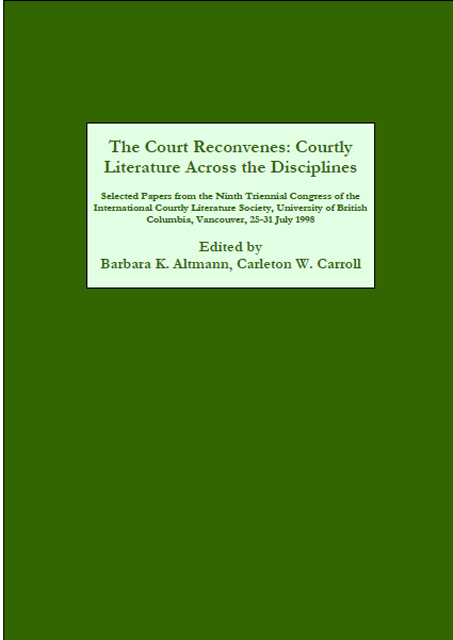 The Court Reconvenes
The Court Reconvenes The Loyal and Disloyal Servants of King John
Published online by Cambridge University Press: 31 March 2023
Summary
The topic of this paper is the definition of loyalty demonstrated in three thirteenth-century texts which present contemporary people. The behaviour of kings is contrasted with the justice and urbanity of knights: King John of England especially is inept, unfair and discourteous.
The chronicler Roger of Wendover, reporting on John's Irish campaign in 1210, tells how John had the penny, halfpenny and farthing of English coinage struck for use in Ireland, till then moneyless; the coins were valid in both countries, and destined for his royal treasury. Apparently randomly, Wendover proceeds:
… the king … took the fortresses of several of his enemies … he besieged the wife of William de Briouze, and William her son, with his wife in a fortress [in the county of Meath] and making prisoners of them sent them loaded with chains into England and ordered them to be closely confined inWindsor castle … in this year … [they] died of starvation in that place. (Flores Historiarum 254–5)
Wendover's account shows the aspects of John's rule which impressed contemporaries: his intense interest in filling his treasury, his political insecurity and ruthless pursuit of his enemies, his treatment of women, and the political importance of Ireland and Wales as outpost Angevin colonies. John's personal interest in Ireland dated from 1185 when he was proclaimed lord of Ireland. Wendover's narrative is contextualized by the barons of the Welsh March (border country) who had colonized Ireland and held vast estates there: de Briouze was a marcher baron. They had enjoyed unusual independence since Henry II's reign, but except for de Briouze and Fouke fitz Warin they were loyal to John. John had inherited a huge debt resulting from payment of the enormous ransom demanded by the Emperor Henry VI for his brother Richard's release in 1193–94, further compounded by his own desperate desire to regain the Angevin lands in France lost in 1204. Very shortly after this, in 1212, the very rebellion of the barons which John feared began brewing, leading to Magna Carta in 1215 and French invasion in 1216.
John's view of his situation is not recorded by Roger of Wendover, who is a partial and inaccurate chronicler, informed by hearsay and bitterly prejudiced against John.
- Type
- Chapter
- Information
- The Court ReconvenesCourtly Literature across the Disciplines: Selected Papers from the Ninth Triennial Congress of the International Courtly Literature Society, University of British Columbia, Vancouver, 25-31 July 1998, pp. 265 - 274Publisher: Boydell & BrewerPrint publication year: 2002
